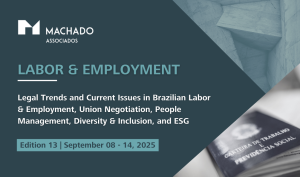Labor & Employment | Edition 13

Key Highlights
Employee’s Holiday Rights – Dependent with Disabilities
The Labor Committee of the House of Representatives approved Bill 5.152/2023, which grants employees in the private and public industries, as well as civil servants and interns, who are responsible for dependents with disabilities, the right to align their vacation period with the school recess or vacation of such dependents. The bill will continue through the legislative process in the House of Representatives.
Employer Liability – Workplace Violence and Damages
The 15th Panel of the São Paulo Regional Labor Court increased the figures of moral damages awarded to an employee who was the victim of robbery, kidnapping, and assault while carrying out work-related activities. The court relied on expert evidence confirming a causal link between the incident and the worsening of the employee’s pre-existing anxiety disorder, highlighting that the traumatic event had a direct impact on the employee’s mental health. During one of his work journeys using a company vehicle, the employee was kidnapped, tied up, subjected to physical assaults, and psychologically intimidated. The incident resulted in temporary incapacity for 15 days and ongoing medical treatment.
Employment Relationship – Cruise Ship Workers
The 8th Chamber of the Regional Labor Court of Campinas (SP) denied the request of a cosmetics salesperson to acknowledge an employment relationship with a cruise ship company. The employee argued that there was an economic group between the foreign company that formally hired him and the cruise operator, claiming that the cosmetics employment agreement had been simulated. He therefore sought annulment of the agreement and acknowledgment of a direct employment bond with the cruise operator. The court, however, upheld the lower court ruling, dismissing all claims on the grounds of insufficient evidence to establish an employment relationship with the cruise company.
Intellectual Property – Employee Compensation
The 7th Panel of the Superior Labor Court (TST) rejected the appeal of a telecommunications company against a ruling that ordered it to pay R$ 1.5 million in compensation to a systems analyst. Over more than 36 years of employment, the analyst developed software that generated millions in profits for the company. According to the court, by consistently accepting the employee’s creations and profiting from them, the company created a legitimate expectation of compensation, thereby characterizing a tacit contractual arrangement.
Labor Enforcement – Liability of Former Partners
The Labor Committee of the House of Representatives approved Bill 2.884/2024, which establishes a two-year limit for a former partner to be held secondarily liable for the company’s labor debts after his/her withdrawal. According to the bill’s author, the aim is to avoid interpretations that treat the two-year period merely as a deadline for filing lawsuits, rather than a time limit for initiating effective enforcement against the former partner. The text also provides that, in cases of proven fraud in the amendment of the articles of association, the former partner will remain jointly liable with other parties.
Mass Layoffs – Low Productivity
A major financial institution carried out the dismissal of more than one thousand employees, most of whom were working under a hybrid model. The decision followed a detailed review of productivity indicators and workplace conduct, which the institution deemed misaligned with its culture and values.
Validity of Resignation – CIPA Member
The 1st Panel of the Regional Labor Court of Rio Grande do Sul overturned a lower court ruling that had acknowledged transitory job tenure for a member of employer’s Internal Accident Prevention Commission (CIPA) who had resigned in order to take up employment with another company. The court held that acknowledging the validity of a claim of null dismissal in such case would constitute an abuse of rights, since the employee was already employed and receiving wages from the new company while simultaneously seeking compensation from the former employer. Therefore, the court found no grounds to invalidate the resignation due to the absence of union ratification.
Work Interdiction – Employer Liability
The Labor Committee of the House of Representatives approved Bill 5.648/2023, which expands the liability of employers who maintain work routines in establishments that have been interdicted or in projects suspended by labor inspections. Under the bill, the mere continuation of activities in interdicted workplaces or suspended projects will be considered an illegal act, regardless of actual harm (strict liability). This represents a shift from the current rule, which requires proof of fault (subjective liability). The bill will now proceed to other committees within the House of Representatives for further consideration.
This newsletter is for informational purposes only. For further clarification, please contact our Labor & Employment team. Machado Associados. All rights reserved.

